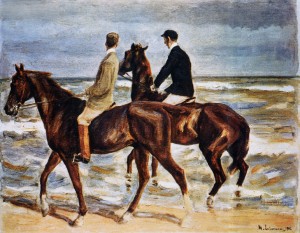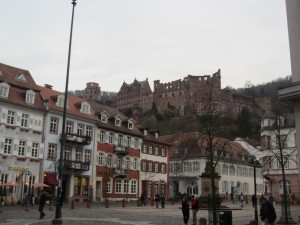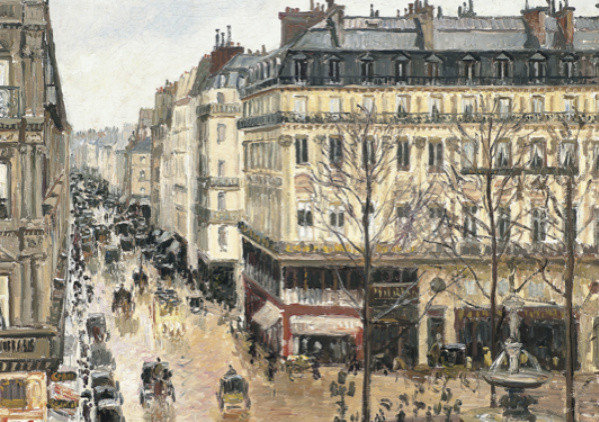Three New Members Are Added but German Museums Can Still Decline to Participate
After nearly a year of hinting at changes the Advisory Commission in Germany that makes recommendations to state museums on claims for allegedly Nazi-looted works in their collections (“Beratende Kommission im Zusammenhang mit der Rückgabe NS-verfolgungsbedingt entzogener Kulturgüter, insbesondere aus jüdischem Besitz,” or “Advisory Commission on the return of cultural property seized as a result of Nazi persecution, especially Jewish property”), the federal government announced last week the addition of three new members. Yet despite public outcry over the outdated and opaque procedures of the commission (better known as the Limbach Commission, in reference to the late Jutta Limbach, presiding member and former judge of the Constitutional Court), none of the fundamental flaws in the panel have been confronted or addressed. Instead, the occasion has served as little more than another photo opportunity for federal Minister of Culture Monika Grütters, whose visage dutifully accompanies all the recent announcements.
Read More
Topics:
Legislation,
Frankfurter Allgemeine Zeitung,
Stefan Koldehoff,
Beratende Kommission,
Gurlitt,
NS Raubkunst,
Restitution,
Bavarian State Paintings Collection,
Looted Art,
World War II,
Süddeutsche Zeitung,
Monika Grütters,
Limbach Commission,
Bayerische Staatsgemäldesammlungen,
Raphael Gross,
Gary Smith,
Marion Eckart-Hofer,
Simon Dubnow Institute,
American Academy in Berlin,
Rudiger Mahlo,
Jewish Claims Conference
I won’t be in the neighborhood, but the Oskar Reinhart Museum in Winterthur (Switzerland) is putting on a conference for the second year in a row on August 31. 2015 wrestling with the issue of “flight goods” in particular. “Flight goods” refers to property that was not stolen outright, nor sold under duress, but left behind because of a flight in haste from persecution. Awareness has increased in recent years about this as a category of looted property to be addressed. As with other categories, issues of law, morality, and the rights of subsequent good faith owners/possessors make for interesting discussions. Notable presenters include Matthias Frehner, whose Kunstmuseum Bern is grappling with the Gurlitt bequest, and Anja Heuss, whose Staatsgalerie Stuttgart recently restituted a work to the heirs of I. Rosenbaum. All the speakers and topics look excellent.
Read More
Topics:
Berlin,
Dr. Peter Raue,
Walter Feilchenfeldt,
Esther Tisa Francini,
Museum Rietberg,
Olaf Ossmann,
Cornelius Gurlitt,
Marc Fehlmann,
Art Dealers Association of Switzerland,
Between Fairness and Justice for Successors and Po,
Oskar Reinhart Museum,
Anja Heuss,
Kulturstiftung der Länder,
Deutsches Zentrum Kulturgutverluste,
Claudius Ochsner,
Matthias Frehner,
Alexander Jolles,
Winterthur,
Dr. Stephanie Tasch,
Kunsthandelsverband der Schweiz,
Karin Salm,
Universität Salzburg,
Thomas Buomberger,
Restitution,
Events,
Johannes Nathan,
Looted Art,
World War II,
Staatsgalerie Stuttgart,
Switzerland,
Kunstmuseum Bern,
Andrea Baresel-Brand,
flight goods,
Zürich,
Prof. Dr. Georg Graf,
Radio SRF 2,
I. Rosenbaum,
Sibylle Ehringhaus
Two weeks ago, the Federal Republic of Germany and Bavaria moved to dismiss the restitution claims brought by David Toren over ownership of Two Riders on the Beach (Zwei Ritter am Strand) by the German painter Max Liebermann. Toren’s uncle David Friedmann owned the painting in Breslau before he was targeted for his collection and it was stolen. Toren had not seen it since adolescence. The painting is further notable for two (related) reasons: it is among the 1,280 works of art found in Cornelius Gurlitt’s apartment in 2012, and it is one of only two that the Gurlitt Task Force has recommended be restituted (to Toren). As we noted at the time of the motion, Germany’s tactics seemed odd; Bavaria has committed to complying with the Task Force’s recommendations, and contesting this case seems to make little sense. The likeliest reason, in our view, is to try to make some jurisdictional law that will weaken other potential claimants to the Gurlitt trove.
Read More
Topics:
Schwabinger Kunstfund,
Hildebrand Gurlitt,
Cornelius Gurlitt,
Breslau,
Max Liebermann,
Germany,
Silesia,
Gurlitt Collection,
Foreign Sovereign Immunities Act,
bailment,
Entartete Kunst,
FSIA,
Restitution,
Bavaria,
David Toren,
Zwei Ritter am Strand,
Free State of Bavaria,
28 U.S.C. § 1605(a)(2),
Looted Art,
World War II,
Foreign Sovereign Immunities,
Altmann v. Republic of Austria,
Freistaat Bayern,
Kunstmuseum Bern,
Riders on the Beach,
Federal Republic of Germany,
Raubkunst,
David Friedmann,
Münchner Kunstfund
To date, only one lawsuit has been filed in the United States related to the seizure from Cornelius Gurlitt’s apartment of some 1,280 works of art, a story that broke a year ago with the concern about the objects’ Nazi-looting connections via his father Hildebrand Gurlitt (the view here last winter was that the longer Germany failed to address the situation comprehensively, the more likely such U.S. litigation became). That lawsuit, brought by David Toren, seeks the return of Two Riders on the Beach (Zwei Ritter am Strand), by Max Liebermann. Germany and Bavaria moved to dismiss the case yesterday, which is particularly puzzling given that among the very few determinations made by the Gurlitt Task Force (in August), it is that the Liebermann should be returned. The cynical view is that they are looking to forestall future claims, but it is past time for the painting to be returned.
Read More
Topics:
Schwabinger Kunstfund,
Hildebrand Gurlitt,
Cornelius Gurlitt,
Breslau,
Max Liebermann,
Germany,
Silesia,
Gurlitt Collection,
Foreign Sovereign Immunities Act,
bailment,
Entartete Kunst,
FSIA,
Restitution,
Bavaria,
David Toren,
Zwei Ritter am Meer,
Free State of Bavaria,
28 U.S.C. § 1605(a)(2),
Looted Art,
World War II,
Altmann v. Republic of Austria,
Freistaat Bayern,
Kunstmuseum Bern,
Riders on the Beach,
Federal Republic of Germany,
Raubkunst,
David Friedmann,
Münchner Kunstfund
After the 1998 Washington Conference on Holocaust Era Assets and the eponymous Washington Conference Principles on Nazi-Stolen Art that came out of it, it is hardly surprising that a recurring theme has been to assess the progress of those nations that participated and signed on. Equally unsurprisingly, those assessments are usually more anecdotal than empirical, and usually arise out of a particular case or cases in the context of that country’s response.
Read More
Topics:
Graham Bowley,
Macedonia,
Netherlands,
Terezin Declaration,
Mussolini,
Latvia,
Dr. Wesley A. Fisher,
Hungary,
ICOM,
Bulgaria,
Commission for the Compensation of Victims of Spol,
Germany,
Bavarian Minister of Culture,
Nazi-looted art,
Die Welt,
Belarus,
Lex Gurlitt,
Washington Conference on Holocaust Era Assets,
France,
Dr. Ruth Weinberger,
Romania,
Baron Mor Lipot Herzog,
Winfried Bausbeck,
Belgium,
Slovakia,
Vichy,
World Jewish Restitution Organization,
Bundesrat,
Washington Conference Principles on Nazi-Stolen Ar,
Gurlitt,
WJRO,
NS Raubkunst,
Restitution,
International Council of Museums,
Norway,
United States,
Luxembourg,
Looted Art,
World War II,
St. Petersburg,
Poland,
beschlagnahmte Kunst,
Ukraine,
Austria,
Serbia,
Conference on Jewish Material Claims Against Germa,
Italy,
Bosnia,
New York Times,
Monika Grütters,
Slovenia,
Estonia,
Museum and Politics Conference,
National Gallery,
Museum of Fine Arts,
entzogogene Kunst,
Czech Republic
A conference was held last week at the Oskar Reinhart Museum in Winterthur, Switzerland, entitled “Fluchtgut: Geschichte, Recht und Moral” (Flight Goods: History, Law and Morality). The objective conference was described in its program as follows (my translation):
Read More
Topics:
Expressionist,
Esther Tisa Francini,
Allied Collecting Points,
Südkurier,
Auctions,
Florian Weiland,
Oskar Reinhart Museum,
Dresden,
Karl Schmidt-Rotluff,
Nazi-looted art,
Robert Graetz,
Buchholz Gallery,
German Advisory Commission for the Return of Cultu,
Winterthur,
Entartete Kunst,
Beratende Kommission,
Curt Valentin,
Restitution,
Melissa Müller,
Luzern,
Clara Levy,
Farm in Dangast,
Fluchtgut: Geschichte Recht und Moral,
Lucas Elmenhorst,
Luxembourg,
Looted Art,
World War II,
Lucerne,
Switzerland,
degenerate art,
Handelsblatt,
Lost Lives Lost Art Jewish Collectors Nazi Art The,
Galerie Fischer,
Imke Gielen,
Washingtoner Prinzipien,
Jutta Limbach,
Washington Principles,
Drei Grazien,
Flight Goods: History Law and Morality,
Lovis Corinth,
Monika Tatzkow,
Three Graces,
Bavarian State Painting Collections,
Raubkunst,
Hans Posse,
Limbach Commission,
Bayerische Staatsgemäldesammlungen
In one of the first affirmative steps taken by Cornelius Gurlitt since the revelation of the seizure of a large number of artworks with possible Nazi-seizure connections, Gurlitt has filed a criminal complaint concerning his allegations of violations of his privacy rights. According to Gurlitt’s attorney, “The surrender of investigative information to the press, and with it the severe damage to his personal rights is not tolerable in any way for Mr. Gurlitt. . . . This is a blatant violation of official secrecy.” Another of his lawyers went on to express concern for trust in the process in which details were being given to the media. In particular, Gurlitt’s team were most upset about photographs in the Focus piece that broke the story of Gurlitt’s apartment.
Read More
Topics:
Stuttgart,
Das Alte Schauspielhaus,
Cologne,
Irina Alter,
veschollene Kunst,
Schwabinger Kunstfund,
Wiedergutmachung,
Annette Weber,
Hildebrand Gurlitt,
Cornelius Gurlitt,
Corinna Budras,
S. Lane Faison,
Universität Heidelberg,
Augsburg,
Institute for Jewish Studies Heidelberg,
Aryanization,
Anat Feinberg,
Willi Korte,
Schwabinger Kunstfund. Kunstfund München,
Monuments Man,
Gurlitt Task Force,
Germany,
Fall Gurlitt,
Köln,
Nazi-looted art,
Henry Keazor,
Gurlitt Collection,
Appropriated Art the Gurlitt Case,
Kurpfälzisches Museum Heidelberg,
Hochschule für Judische Studien Heidelberg,
Eberhard Karls-Universität Tübingen,
Emily Löffler,
CSU,
Williams College,
Judische Allgemeine,
Hildebrand Gurlit,
Entartete Kunst,
Universität Zürich,
Arisierung,
Lehrstuhl für Römisches Recht und Privatrecht,
Nürnberger Institut,
Rückgabe,
Rhein-Neckar Morgenweb,
Beutekunst,
'Stürmer-Bibliothek',
Magdeburg,
Daniel Krochmalnik,
Ersessene Kunst,
Katja Terlau,
Art Loss Recovery Unit,
Jim Tobias,
Rhein-Neckar Zeitung,
Fritz Backhaus,
Gurlitt,
Bavaria,
Johannes Heil,
Wien,
Sullivan & Worcester LLP,
Lucas Elmenhorst,
Kunsthistorisches Institut,
Nürnberg,
Jüdisches Museum Frankfurt,
Looted Art,
„Sturmer-Library“,
degenerate art,
Boston,
Seminar für Neuere Geschichte,
Wolfgang Ernst,
www.lostart.de,
Nazi art,
Raubkunst,
Nicholas M. O'Donnell,
Frieder Hepp,
Verjährung,
Vienna,
Münchner Kunstfund,
New York,
FAZ Frankfurt,
Felicitas Heiman-Jellinek
I’ve just returned from my presentation in Heidelberg at the Hochschule für Jüdische Studien in Heidelberg at the conference Ersessene Kunst—Der Fall Gurlitt; Appropriated Art—The Gurlitt Case. The presentations were, without exception, outstanding. They ranged from rarely-told case stories, to sharp insights of some of the overarching principles that guide the the Gurlitt case and similar events. As the discussions made clear, this case will not be easily resolved. That in turn makes recent reports that Cornelius Gurlitt has indicated a willingess to discuss the art's return all the more significant.
Read More
Topics:
Maria Altmann,
Leopold Reidemester,
Ministerin für Justiz und Kultur,
Stuttgart,
Das Alte Schauspielhaus,
Cologne,
Irina Alter,
Portrait of Adele Bloch-Bauer,
veschollene Kunst,
Focus,
Schwabinger Kunstfund,
Aschbach Castle,
Mussolini,
Wiedergutmachung,
Annette Weber,
Monte Cassino,
Cornelius Gurlitt,
Corinna Budras,
S. Lane Faison,
Breslau,
Universität Heidelberg,
Augsburg,
Aryanization,
Anat Feinberg,
Willi Korte,
Schwabinger Kunstfund. Kunstfund München,
Monuments Man,
Jud Süss,
Wrocław,
Dresden,
Gurlitt Task Force,
Germany,
Silesia,
Fall Gurlitt,
Wallraf-Richartz Museum,
Köln,
Nazi-looted art,
Henry Keazor,
Gurlitt Collection,
Appropriated Art the Gurlitt Case,
Schloss Aschbach,
Die Welt,
Kurpfälzische Museum Heidelberg,
Hochschule für Judische Studien Heidelberg,
Karl Haberstock,
Eberhard Karls-Universität Tübingen,
Emily Löffler,
CSU,
Williams College,
Hildebrand Gurlit,
Entartete Kunst,
Universität Zürich,
Arisierung,
Lehrstuhl für Römisches Recht und Privatrecht,
Württemberg,
Schlesien,
Nürnberger Institut,
Hamburg,
Otto Förster,
Rückgabe,
Beutekunst,
'Stürmer-Bibliothek',
Magdeburg,
Portrait of Amalie Zuckerkandl,
Ersessene Kunst,
Katja Terlau,
Art Loss Recovery Unit,
Jim Tobias,
Hermitage,
Gurlitt,
Bavaria,
Johannes Heil,
Wien,
Sullivan & Worcester LLP,
Lucas Elmenhorst,
Events,
Kunsthistorisches Institut,
Nürnberg,
Jüdisches Museum Frankfurt,
Looted Art,
„Sturmer-Library“,
degenerate art,
Seminar für Neuere Geschichte,
Wolfgang Ernst,
Justizminister,
Göring,
www.lostart.de,
Nazi art,
Raubkunst,
Nicholas M. O'Donnell,
Frieder Hepp,
Verjährung,
Vienna,
Claudius Krausharr,
Münchner Kunstfund,
Zwickau,
Kajetan Mühlmann,
New York,
Werner Haftmann,
FAZ Frankfurt,
Felicitas Heiman-Jellinek
The Institute for Jewish Studies in Heidelberg (the Hochschule für Judische Studien Heidelberg) will host a one-day conference on January 26, 2014 entitled “Appropriated Art—The Gurlitt Case” (Ersessene Kunst—Der Fall Gurlitt). Leading academics, journalists, and researchers will put the Gurlitt find into a historical and legal perspective. As listed below, the depth of topics that will be presented is outstanding. Last, and very much least, I will present on the efficacy, challenges, and policy considerations in U.S. art restitution litigation.
Read More
Topics:
Stuttgart,
Das Alte Schauspielhaus,
Cologne,
Irina Alter,
Schwabinger Kunstfund,
Wiedergutmachung,
Annette Weber,
Hildebrand Gurlitt,
Cornelius Gurlitt,
Corinna Budras,
Universität Heidelberg,
Institute for Jewish Studies Heidelberg,
Aryanization,
Anat Feinberg,
Fall Gurlitt,
Köln,
Nazi-looted art,
Henry Keazor,
Gurlitt Collection,
Appropriated Art the Gurlitt Case,
Kurpfälzische Museum Heidelberg,
Hochschule für Judische Studien Heidelberg,
Eberhard Karls-Universität Tübingen,
Emily Löffler,
Entartete Kunst,
Universität Zürich,
Arisierung,
Lehrstuhl für Römisches Recht und Privatrecht,
Nürnberger Institut,
Rückgabe,
Beutekunst,
'Stürmer-Bibliothek',
Daniel Krochmalnik,
Ersessene Kunst,
Katja Terlau,
Jim Tobias,
Fritz Backhaus,
Johannes Heil,
Wien,
Sullivan & Worcester LLP,
Events,
Kunsthistorisches Institut,
Nürnberg,
Jüdisches Museum Frankfurt,
Looted Art,
„Sturmer-Library“,
degenerate art,
Boston,
Seminar für Neuere Geschichte,
Wolfgang Ernst,
Raubkunst,
Nicholas M. O'Donnell,
Frieder Hepp,
Vienna,
Münchner Kunstfund,
New York,
FAZ Frankfurt,
Felicitas Heiman-Jellinek
The U.S. Court of Appeals for the 9th Circuit restored last week claims by heirs of Lilly Cassirer against the Thyssen-Bornemisza Collection for the return of the Camille Pissarro painting Rue St. Honoré, après-midi, êffet de pluie.
Read More
Topics:
Nuremberg laws,
Schwabinger Kunstfund,
Cornelius Gurlitt,
Lilly Cassirer,
California Code of Civil Procedure § 338(c),
Dorothy Nelson,
Thyssen-Bornemisza Collection,
Julius Schoeps,
Rue St. Honoré après-midi êffet de pluie,
Claude Cassirer,
Von Saher v. Norton Simon,
de Csepel,
Jacques Goudstikker,
California Code of Civil Procedure § 354.3,
Gurlitt Collection,
Foreign Sovereign Immunities Act,
Hans Sachs,
Von Saher v. Norton Simon Museum of Art at Pasaden,
Madame Soler,
Bundesgerichtshof,
Hildebrand Gurlit,
Entartete Kunst,
Hans-Heinrich Thyssen-Bornemisza,
Hungarian National Gallery,
Nazis,
Munich,
Deutches Historisches Museum,
FSIA,
Preemption,
Gurlitt,
Harry Pregerson,
Restitution,
field preemption,
Marei Von Saher,
Herzog collection,
Bavaria,
Claudia Seger-Thomschitz,
Looted Art,
World War II,
Foreign Sovereign Immunities,
Pinakothek der Moderne,
degenerate art,
Altmann v. Republic of Austria,
578 F.3d 1016,
Freistaat Bayern,
beschlagnahmte Kunst,
Camille Pissarro,
Kim McLane Wardlaw,
Nürnberger Gesetze,
Raubkunst,
Museum of Fine Arts Boston,
Cassirer v. Thyssen-Bornemisza Collection,
verschollene Kunst,
Kunstfund München







